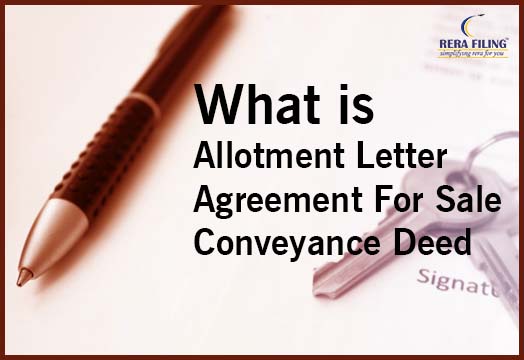

An allotment letter is a crucial document in the real estate sector during the purchase of property in India. If a person is buying an under-construction property then an allotment letter is provided by the builder to the prospective buyer . It is issued once the buyer pays 15% of the property value to the developer.
Importance of Allotment letter
1. This letter comprises the facts and figures about the property and its various details.
2. This letter basically elaborates on the construction details and plans, architectural details, etc. and the amount of money to be paid to the builder.
3. It is the only document for an unfinished property which acts as a proof of property dealing.
4. It is vital in availing loan from the bank, as the letter mentions the amount of money which one has to pay to the builder so that the remaining amount can be financed by the bank. On the basis of this letter, the bank finances the remaining amount.
5. Even though the sale agreement is the primary sale document, an allotment letter can come in handy as proof when promised amenities have not been provided as specified by the builder.
Note: An important judgment has been recently passed by the MAHARERA Tribunal where the allottees had purchased a flat in Winter Green of Rivali Park, Borivali East for Rs 1,48,73,782 and for the said price promoter issued allotment letter in November 2012. The promoter agreed to hand over the possession in February 2016. But the promoter failed to deliver the possession of the said flat and the project got delayed by almost four years. Later on, the allottees moved to MAHARERA for withdrawing from the project and seeking a refund with 18% interest. Therefore considering this case, the MAHARERA Tribunal concluded that the homebuyers with the allotment letter are also eligible to seek a refund of the booked flat with interest under section 18 of the RERA Act, 2016, from the builder.
Also read: MAHARERA Amendment Rules, 2019
Contents of the allotment letter:
It carries the following details such as:
1. Payment options
2. Details of the flat
3. Terms of construction, Construction schedule.
4. Amenities promised by the developer like clubhouse, parks, gym, etc.
5. The final amount due to the buyer inclusive of taxes.
5. The delivery date and the builder’s liability in case of late completion.
Agreement for Sale
As per Section 2 (c) of the RERA Act, 2016, "agreement for sale" means an agreement entered into between the promoter and the allottee.
An agreement for sale is an agreement to sell a property in the future. It contains the terms and conditions of any prospective contract of sale. Any violation of terms of an agreement to sell can result only in a suit for damages.
Some of the main clauses in agreement to sell which are defined below:
1. Name of both the parties with their age and their respective residential addresses.
2. The date and place of execution of the agreement.
3. The Consideration amount, mode and the time of payment.
4. Penalty and forfeiture clauses in case of default (varies case to case)
5. The conditions on which possession shall be delivered.
6. The rights, obligations, and liabilities of each party.
7. The proportion of expenses to be met by each party.
The execution of an agreement for sale needs to be witnessed by two persons capable of entering into a contract. The witnesses can be from both the parties- one from the purchaser’s side and one from the seller’s side.
Conveyance Deed
A conveyance deed is one such document that is required when there is a transfer of ownership of any property from one person to another. The term deed means a written legal contract that binds the parties to its terms and can be proved in the court as evidence. There is a slight difference between the terms conveyance deed and sale deed, although both are used interchangeably. All sale deeds are conveyance deeds but conveyance deeds can also include gift, exchange, mortgage and lease deeds and other transfers.
Importance of Conveyance Deed
Absence of conveyance deed can trap us in various problems. In order to avoid them, one must understand its importance:
1. In order to become the absolute owner of the property, one must possess a conveyance deed.
2. The presence of a valid conveyance deed can protect us from the fraudulent transfers of the property.
3. This document can be easily used as evidence to prove the ownership rights over the property.
4. To register the property in the Government records, one must have a conveyance deed.
Essential documents required for Conveyance Deed
1. PAN Card of both the parties
2. Proof of stamp duty paid
3. Registration charges
4. Copies of electricity bill and property taxes paid
5. The final copy of the conveyance deed
6. Authorization certificate and occupancy certificate
7. Agreement between builder and buyer.